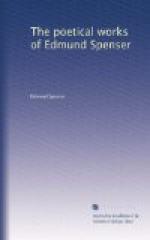XXXI.
That same is now nought but a champian wide,
Where all this worlds pride once was situate.
No blame to thee, whosoever dost abide
By Nyle, or Gange, or Tygre, or Euphrate;
Ne Afrike thereof guiltie is, nor Spaine,
Nor the bolde people by the Thamis brincks,
Nor the brave warlicke brood of Alemaine,
Nor the borne souldier which Rhine running drinks.
Thou onely cause, O Civill Furie, art!
Which, sowing in th’Aemathian fields thy spight,
Didst arme thy hand against thy proper hart;
To th’end that when thou wast in greatest hight
To greatnes growne, through long prosperitie,
Thou then adowne might’st fall more
horriblie.
[XXXI. 10.—Aemathian fields.
Thessalian fields; alluding to the
battle fought at Pharsalia, in Thessaly, between Caesar
and Pompey. H.]
XXXII.
Hope ye, my Verses, that posteritie
Of age ensuing shall you ever read?
Hope ye that ever immortalitie
So meane harpes worke may chalenge for her meed?
If under heaven anie endurance were,
These moniments, which not in paper writ,
But in porphyre and marble doo appeare,
Might well have hop’d to have obtained it.
Nath’les, my Lute, whom Phoebus deigned to give,
Cease not to sound these olde antiquities:
For if that Time doo let thy glorie live,
Well maist thou boast, how ever base thou bee,
That thou art first which of thy nation
song
Th’olde honour of the people gowned
long.
L’ENVOY.
Bellay, first garland of free poesie
That France brought forth, though fruitfull of brave
wits,
Well worthie thou of immortalitie,
That long hast traveld*, by thy learned writs,
Olde Rome out of her ashes to revive,
And give a second life to dead decayes!
Needes must he all eternitie survive,
That can to other give eternall dayes.
Thy dayes therefore are endles, and thy prayse
Excelling all that ever went before:
And, after thee, gins Bartas hie to rayse
His heavenly Muse, th’Almightie to adore.
Live happie spirits, th’honour of
your name,
And fill the world with never dying fame!
[* Traveld, travailed, toiled.]
L’Envoy, 11.—Bartas. Guillaume de Salluste du Bartas, a French poet of the time of Henry IV, of extraordinary popularity in his day. His poem on the Creation is said to have been reprinted more than thirty times in six years, and was translated into several languages; among others, into English by Joshua Sylvester. H.
MUIOPOTMOS:
OR
THE FATE OF THE BUTTERFLIE.
BY ED. SP.




